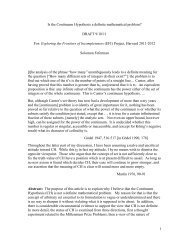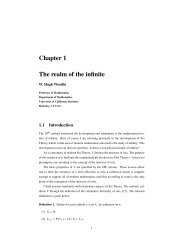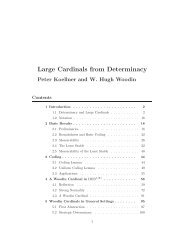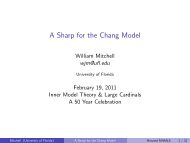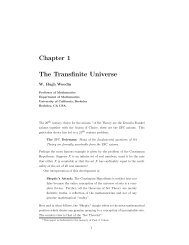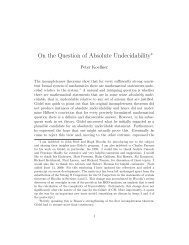SOME SET THEORIES ARE MORE EQUAL ... - Logic at Harvard
SOME SET THEORIES ARE MORE EQUAL ... - Logic at Harvard
SOME SET THEORIES ARE MORE EQUAL ... - Logic at Harvard
You also want an ePaper? Increase the reach of your titles
YUMPU automatically turns print PDFs into web optimized ePapers that Google loves.
<strong>SOME</strong> <strong>SET</strong> <strong>THEORIES</strong> <strong>ARE</strong> <strong>MORE</strong> <strong>EQUAL</strong> 7use of the stronger axioms looks to them like an unnecessary logicians’finicking.There are other examples like Martin’s proof of Borel Determinacywhich initially was inferred from his proof of analytic determinacy usingmeasurable cardinals and the Wadge Borel determinacy , which lookslike any genuine st<strong>at</strong>ement studied by analysts, which was proved originallyfrom Borel determinacy, hence used ZFC in a strong way butwas l<strong>at</strong>er proved in second order arithmetic.In summary I think th<strong>at</strong> it is very likely th<strong>at</strong> the working m<strong>at</strong>hem<strong>at</strong>icianwill run into problems th<strong>at</strong> the only way to settle them willbe by expanding the usual axiom system of Set Theory. And the m<strong>at</strong>hem<strong>at</strong>icalcommunity will accept such a solution as legitim<strong>at</strong>e if the settheoretical principles used will be accepted as part of a canonical widelyaccepted system of axioms.We , as set theorists , face the problem of how to choose among themultitude of possible set theories those th<strong>at</strong> will be m<strong>at</strong>hem<strong>at</strong>icallyfruitful,and acceptable in the long run. The next sections will chartsome of the consider<strong>at</strong>ions th<strong>at</strong> can lead us in this process.4. The search for new axiomsWe are going to present several criteria or principles th<strong>at</strong> shouldserve as guidance in the search for new axioms. These are r<strong>at</strong>her informalprinciples which leave a large leeway in their interpret<strong>at</strong>ion in aparticular case.We see the search for new axioms as a ongoing process, not dissimilar to the process in other fields of science , by which a scientifictheory is crystalized by a sequence of trials and errors, where <strong>at</strong>any particular moment there may be several competing options. Thecriteria of testing a particular axiom or a set of axioms is very likelyvery different form those used in Science but there are similarities. Thefamous quote from Gödel [15] is very appropri<strong>at</strong>e introduction to theprocess we envision.. . . Even disregarding the intrinsic necessity of some newaxiom. . . a probable decision about its proof is possiblealso . . . by studying its success. Success here meansfruitfulness in consequences. . . There might exist axiomsso abundant in their verifiable consequences, sheddingso much light upon a whole field and yielding such powerfulmethods for solving problems . . . th<strong>at</strong>, no m<strong>at</strong>terwhether or not they are intrinsically necessary, theywould have to be accepted <strong>at</strong> least in the same senseas any well-established physical theory



